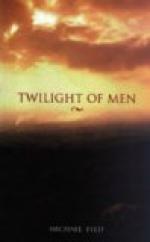“God forbid! No. Oh, no.” The woman’s instant denial was horrified. “Not the McDonald lot. They’re all revolutionaries. All of them. It’s—it’s unthinkable. It certainly is.”
The man moved away.
“That’s so,” he agreed. “Well, anyway, I’ll do the best I know for the child, Sally. You can trust me.”
The woman’s anxiety abated, and she rose from her chair.
“I know that, Charles,” she said. “But the McDonalds! They’re—”
“Sure they are.” The man laughed. “Well, good-bye, my dear. I’ll tell you all about it when I’ve fixed things. Thank goodness it’s quit snowing and the sun’s shining again. I wish I felt as good as it looks outside here.”
* * * * *
Charles Nisson had become a lawyer without any marked inclination or enthusiasm for his profession. It had been simply a matter of following the father before him. It would have been much the same if his father had been a farmer, or a politician, or anything else. The son was patient, temperate, and of no great ambition. But he was also keenly intelligent. Without impulse, or striking originality, but with a tremendous capacity for hard work, he was bound to be moderately successful in any career. In his father’s profession his temperament was particularly suited, and in spite of lacking enthusiasm he had become unquestionably a better lawyer than the country attorney he had succeeded.
Just now his mind was filled with unease. The matter of his forthcoming interview with a child of sixteen years had only small place in the affairs which disturbed him. His real concern was for his friend, Leslie Standing, and the disaster, which, in a seemingly overwhelming rush had befallen at far-off Sachigo. Again his trouble had no relation to these things as they affected his own worldly affairs. It was of the man himself he was thinking.




